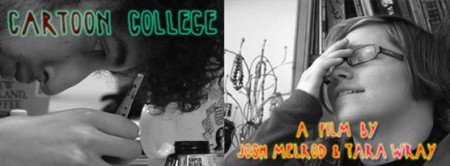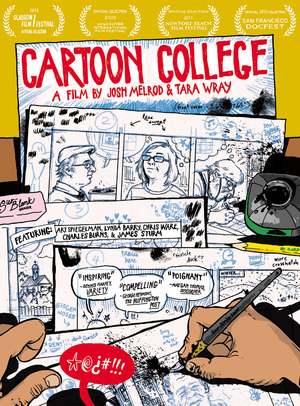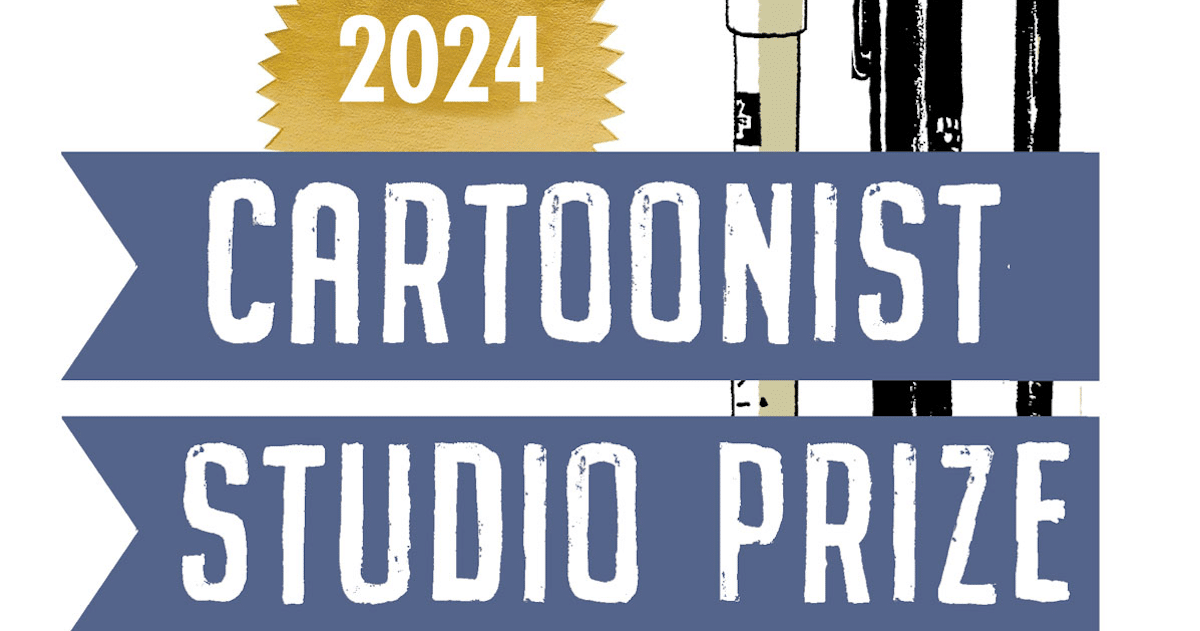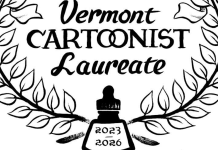Representing comics production in popular culture has long been missing a piece of the puzzle. We’ve had excellent documentaries about ground-breaking creators like Will Eisner, characters like Wonder Woman, and even explorations of rising con-culture in the USA, but the least likely to receive attention, the mode of indie comics production right now, has come out as the lead story in Tara Wray and Josh Melrod’s CARTOON COLLEGE. This is a documentary ahead of its time, since the subject could easily have languished for another decade or more in the shadow of further works on superheroes, the history of the big two, or just worthy single-creator features. However, in an instance of remarkable commitment to a pressing, immediate subject, Wray and Melrod have delivered not only the stories of aspiring comics artists as they grapple with real-life issues, but also a film rendered so professionally and decisively that it can stand alongside documentaries of other art forms in the public arena right now.
That means that viewers who are new to comics, or even barely aware of the hands-on rigor behind making comics are going to be exposed to indie comics as an art form on par with fine art, high literature, and theatre. It’s a film that speaks equally well to insiders and outsiders in comics, professionals and readers, no small feat. CARTOON COLLEGE pursues the lives and educational experiences of students enrolled in the Master of Fine Arts Degree in Comics at Vermont’s Center for Cartoon Studies, as well as giving testimonials and talking points from many of the major voices in indie comics right now, from Stephen Bissette to Art Spiegelman, Chris Ware, and Lynda Barry, many of whom are involved in teaching at the school itself. The documentary pursues a loose chronological structure, with chapters that correspond to stages in student development, but also jumps in with thematic emphasis on marketing, developing an identity as a cartoonist, and also making decisions about whether to pursue a career in comics.
It’s not a prolonged infomercial about how to produce comics, if there was any doubt about that, but rather a gradual descent under the skin of real comics making and production, which is what makes the film so unusual among comics-related documentaries already in existence. The only way for the film to get under the skin of indie comics is to approach the meaning and value of comics-making through a collection of individual voices, following several students through their studies and uncovering along the way the origin of their pursuit of comic art, the factors in their lives that help or hinder their pursuit, and the ways in which they become part of a community of cartoonists at the Center.

Some of the opening commentary to the documentary indicates the kind of wider ignorance comics artists face in a world “completely ready to dismiss you” when you suggest to others that you’re interested in pursuing comics. Many of the students express very real prejudice against their goals from family, friends, and social groups, and the only way students find to counter these powerful trends of opposition are to “approach” comics as a single-minded “life goal”. But the hard facts of the documentary prove that not everyone is going to be able to follow through after the initial steps of committing to comics. At the Center for Cartoon Studies, we witness the resilient return of students who initially fail in their thesis reviews because of a number of factors including handling content in their work that’s too emotional for them to fully address, having to work long hours outside of school to support themselves, and struggling with whether they have the artistic talent to improve under the rigors of study. Following the individual stories, placed carefully within the context of graduating class groups, creates tension for the viewer as they wait to see what the future holds for these aspiring artists.

One thing that the documentary avoids is being overly-cerebral, instead striking a strong balance between elements of the history of comic art and the more human stories being told, with an emphasis on the human. Though histories of indie comics are necessary and helpful, going into the Center for Cartoon Studies with camera crews over the space of a few years and giving the comic creators primacy in the storytelling is what makes this such an important work. It captures life in comics as it is being lived right now and lays down the main factors that will influence the struggles that the Center’s graduates, and cartoonists at large will face in the next decade or more. For insiders in comics making, they’ll find elements they can relate to at every turn, and for those who are comics enthusiasts, they’ll find the life-cycle of comics presented in unadorned and blunt terms as a story they’ve been missing out on. CARTOON COLLEGE is poised to make a big difference in the way that comics creating, and even pursuing an education in comics, is perceived. It gives all due stature to comic art as a craft, as a passion, and as a struggle, but also highlights the turning tide right now as indie comics are increasingly in the public gaze and suggests that this is a crucial, frenetic time for the future of comic art.
The film has been released as a digital download by FilmBuff on multiple platforms already, and is being distributed in DVD format by Thunderpony Productions on pre-order now, shipping in mid-July. But for those in New York City, be sure to catch a screening with Q&A at the Society of Illustrators on July 23rd with the filmmakers and guests Robyn Chapman and R. Sikoryak. You can learn more here and also find information about getting a copy for yourself.









I loved this movie!
I was part of the 2010 graduating class that the film focuses on and while I chose to opt out of the camera’s focus so my focus on growing and creating would not be distracted, I’m extremely thrilled with how the film turned out! It’s so honest and really explains the joint and personal struggles each of us faced as we worked through the 2 year program at CCS. My class was very diverse and CC illustrates quite well all the different walks of life cartoonists come from, which is definitely a problem in the overall public perception. Hooray for Tara and Josh!
I just preordered the movie and look forward to seeing it.
I’ve been an fine artist for years. I only started drawing my own comics and writing them seriously about 2 years ago and let me say that comics are unbelievably harder than creating fine art (in my opinion).
Also like the article above states, people dismiss your work and they will think you are some deadbeat a lot faster than other art professions.
Really enjoyed the film as well and looking forward to the work these creators do.
Comments are closed.